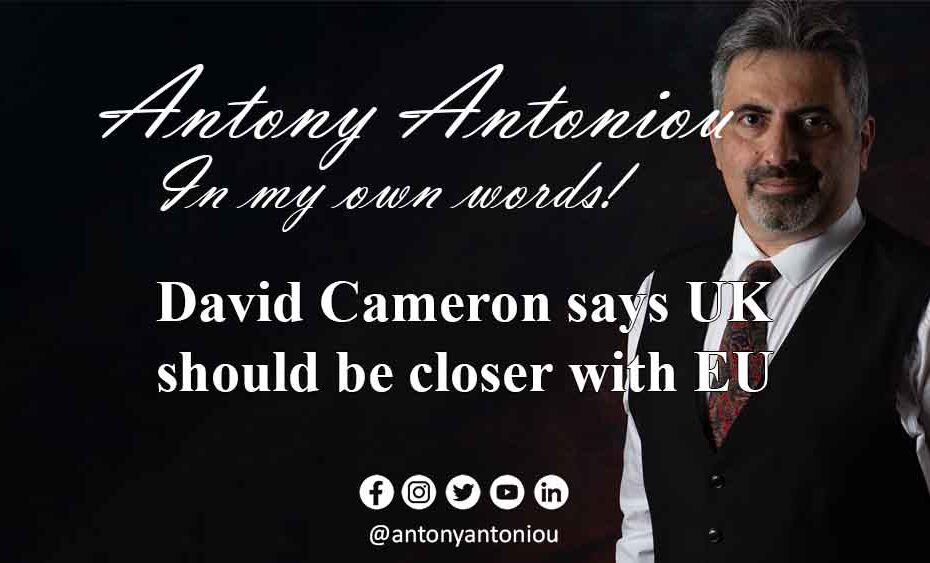David Cameron says UK should be closer with EU
The Brexit Debate Rages On: Assessing David Cameron’s Call for Closer UK-EU Ties
Introduction
Former British Prime Minister David Cameron has sparked fresh controversy over Brexit by arguing that the UK should seek closer ties with the EU on foreign policy and defence. In an exclusive newspaper interview, Cameron said that Britain needs to work more closely with Brussels and described the EU bloc as a “friend, neighbour and partner”.
His comments have provoked a fierce backlash from pro-Brexit Conservatives who warn that he risks reigniting bitter divisions over the UK’s decision to leave the EU. With new Prime Minister Rishi Sunak struggling to unite his party, does Cameron’s intervention demonstrate a lack of political judgement or refreshing pragmatism over future UK-EU relations?
Cameron’s Case for Cooperation
As the Conservative Prime Minister who called the 2016 Brexit referendum and campaigned for Remain, David Cameron has seen his reputation badly damaged by the vote to leave. While stopping short of calling for the UK to rejoin the EU, his plea for closer cooperation suggests a desire to rehabilitate his standing on the international stage.
Specifically, Cameron argues that Britain should align more closely with Brussels on security and defence policy. This reflects a belief that shared European interests in areas like Ukraine make pragmatic cooperation vital regardless of membership status. Implicit within this is a hope that improved relations could also ease disputes over issues like the Northern Ireland Protocol.
Sceptics Dismiss Cameron’s ‘Gravy Train’ Mentality
For ardent Brexiteers like former Brexit Party politician Belinda de Lucy, however, Cameron’s comments smack of an anti-democratic and self-serving mentality. De Lucy argues that while the former PM claims greater cooperation is needed, his real motivation is to repair relations with his pro-EU friends and secure global acclaim.
Similarly, de Lucy cautions that the EU will exploit any openings to gradually erode British sovereignty and democratic consent. From her perspective, the UK must maintain clear red lines on involvement with EU structures to prevent a gradual drift back into the bloc. This demonstrates how underlying distrust of EU motives continues to influence certain Conservatives.
What Do Cameron’s Comments Mean for the Conservatives?
Cameron’s call for alignment also has significant implications for the embattled Conservative government led by Rishi Sunak. Sunak has already provoked Tory unease for appointing ardent Remainer Greg Hands as Trade Secretary. The emergence of Cameron’s pro-EU views compounds a fear among Brexiteers that the government plans to edge closer to Brussels over time.
As political commentator Matthew Stadlen notes, this risks further inflaming divisions within Conservative ranks. Hardline Leavers will blast Cameron’s comments as proof that senior Tories still harbour hopes of eventual EU reintegration. With the Conservatives trailing heavily in the polls, reopening the Brexit divide seems politically reckless and unlikely to tempt back voters who defected over the issue.
The Brexit Legacy
While a thought-provoking intervention, Cameron’s call for closer ties looks destined to further alienate Leavers rather than build bridges. It speaks to the immense challenge facing Conservative leaders in reconciling the two warring EU factions within their ranks. Until they can finally settle the Brexit question, votes will continue bleeding to rival parties.
The heated responses also highlight that the scars from the polarising 2016 campaign remain raw for many,colouring how Cameron’s motives are perceived. Rightly or wrongly, he failed the test set for him by millions of Leave supporters and risks being forever seen by them as the PM who refused to implement their democratic will.
Conclusion
• Former British PM David Cameron has controversially argued that the UK should seek closer ties with the EU on foreign policy and defence matters.
• Cameron says Britain needs to cooperate more with Brussels and has described the EU as a “friend, neighbour and partner”.
• His comments have sparked fury among pro-Brexit Conservatives who warn he risks reigniting bitter divisions.
• Cameron likely wants to rehabilitate his reputation after being damaged by Brexit vote.
• He specifically argues for alignment on security and defence policy due to shared European interests.
• Ardent Brexiteer Belinda de Lucy cautions EU will exploit openings to erode British sovereignty over time.
• De Lucy says Cameron is motivated by desire to please pro-EU friends and secure personal international acclaim.
• Cameron’s call risks inflaming tensions within the divided Conservative Party led by Rishi Sunak.
• Reopening Brexit rifts seems politically hazardous with Conservatives trailing heavily in polls.
• Cameron’s plea for cooperation faces being ignored as trust in EU severely depleted among Brexiteers.
• Until Conservatives resolve Brexit divides, they will keep losing votes to rival parties.
• For many Leavers, Cameron failed test posed by Brexit vote and can’t be redeemed.
• Cameron’s EU vision seems destined to widen Tory splits rather than healing Brexit rifts.
David Cameron’s desire for renewed UK-EU cooperation holds some logic but looks a forlorn hope given current Tory divisions. With trust in Brussels so depleted among Leavers, pragmatic alignment seems unlikely barring a change in government. For now at least, both camps appear destined to continue staring across an unbridgeable Brexit divide.

